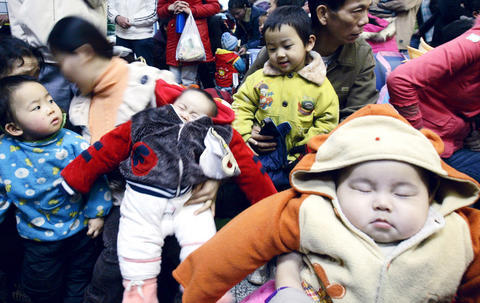China's main north-south national freeway reopened yesterday after weeks of snow and ice storms that throttled transport and disrupted supplies of food and fuel during the country's peak holiday season.
The restoration of traffic along the Zhuhai-Beijing freeway should ease massive logjams that stranded millions of rail and bus passengers and triggered emergency measures to ensure deliveries of coal, water and food.
Rail service was also slowly returning to normal. But cold rain poured down on hundreds of thousands of travelers -- most of them migrant workers -- as they waited at the southern rail terminus of Guangzhou for trains to take them home for the Lunar New Year holiday, which begins on Thursday.

PHOTO: AP
Chinese authorities had canceled hundreds of trains after downed lines left electric trains stopped on the tracks.
About 80 trains left Guangzhou on Sunday with 210,000 passengers aboard, the state-run Southern Metropolis Daily said.
But a river of new travelers flowed into the city yesterday and the area around the main train station was still packed with people. Police were trying to control the masses with tall metal barricades.
In recent days, huge, unwieldy crowds were allowed to gather on a wide boulevard that leads to the station.
Yesterday, police were dividing the huge crowd into groups of about 1,000, with about 100m of space between the groups.
As one group was allowed to enter the train station, the other waves were allowed to advance further up the road. The rumbling sound of hundreds of people pulling their luggage on wheels sounded like a stampede of cattle.
Despite the reopening of the main Zhuhai-Beijing highway, transport officials urged drivers to think twice before venturing out onto the road, warning of renewed congestion and the need to leave lanes open for emergency vehicles and trucks carrying supplies.
Rain and freezing temperatures were also forecast later yesterday and today for parts of Hunan Province, a crucial transit hub that has been among the hardest hit by the unusual weather. More than 10,000 vehicles were reported backed up along a 75km section of the main north-south highway in the province while soldiers and workers furiously sought to remove ice.
State broadcaster CCTV showed troops in tracked and armored troop transporters driving to remote mountain villages along roads covered by sheets of thick ice.
They plowed through downed trees and other debris, all of it shrouded in sparkling ice, then delivered a cargo of water and instant noodles.
Authorities say that the winter storms are China's worst in 50 years, bringing rarely seen snow to Shanghai, although Beijing has remained dry and sunny.
The weather has ripped down power lines and disrupted trains and road transport. Damage has been estimated at 53.8 billion yuan (US$7.5 billion) and at least 60 people have been killed, mostly in traffic accidents, relief officials said.
Parts of Hunan Province have been without electricity for 10 days. Hunan's provincial weather bureau's forecast called for more snow yesterday and today, with temperatures in the provincial capital, Changsha, plunging to minus 4oC.

Indonesia was to sign an agreement to repatriate two British nationals, including a grandmother languishing on death row for drug-related crimes, an Indonesian government source said yesterday. “The practical arrangement will be signed today. The transfer will be done immediately after the technical side of the transfer is agreed,” the source said, identifying Lindsay Sandiford and 35-year-old Shahab Shahabadi as the people being transferred. Sandiford, a grandmother, was sentenced to death on the island of Bali in 2013 after she was convicted of trafficking drugs. Customs officers found cocaine worth an estimated US$2.14 million hidden in a false bottom in Sandiford’s suitcase when

CAUSE UNKNOWN: Weather and runway conditions were suitable for flight operations at the time of the accident, and no distress signal was sent, authorities said A cargo aircraft skidded off the runway into the sea at Hong Kong International Airport early yesterday, killing two ground crew in a patrol car, in one of the worst accidents in the airport’s 27-year history. The incident occurred at about 3:50am, when the plane is suspected to have lost control upon landing, veering off the runway and crashing through a fence, the Airport Authority Hong Kong said. The jet hit a security patrol car on the perimeter road outside the runway zone, which then fell into the water, it said in a statement. The four crew members on the plane, which

Japan’s ruling Liberal Democratic Party (LDP) and its junior partner yesterday signed a coalition deal, paving the way for Sanae Takaichi to become the nation’s first female prime minister. The 11th-hour agreement with the Japan Innovation Party (JIP) came just a day before the lower house was due to vote on Takaichi’s appointment as the fifth prime minister in as many years. If she wins, she will take office the same day. “I’m very much looking forward to working with you on efforts to make Japan’s economy stronger, and to reshape Japan as a country that can be responsible for future generations,”

SEVEN-MINUTE HEIST: The masked thieves stole nine pieces of 19th-century jewelry, including a crown, which they dropped and damaged as they made their escape The hunt was on yesterday for the band of thieves who stole eight priceless royal pieces of jewelry from the Louvre Museum in the heart of Paris in broad daylight. Officials said a team of 60 investigators was working on the theory that the raid was planned and executed by an organized crime group. The heist reignited a row over a lack of security in France’s museums, with French Minister of Justice yesterday admitting to security flaws in protecting the Louvre. “What is certain is that we have failed, since people were able to park a furniture hoist in the middle of